As most of us grow up and grow older, we find that certain songs, for whatever reasons, cling to us and ultimately become a part of us – coloring how we see the world, those around us and ourselves. They may be well-known hits. They may be obscure releases like album cuts from the golden days of LPs. For whatever reason, we accumulate them and absorb them into our lives forever.
That’s as far as it goes for the majority of us. But if you’re a veteran musician with a recording studio, like Tulsa’s Mike Peace, then you have the wherewithal to take things a little farther by bringing in some musical friends, putting several of your special songs on a disc, and sending them back out in your own voice.
That’s what the singer-guitarist-harmonica player has done with Peace Grocery, his first solo CD. It comes after decades of his working steadily as a musician, most notably with the Tulsa-based rock ‘n’ roll group the Dinosaurs, which gigged around the area for some 13 years, and the early ’80s country-rock band Cactus Jack. Now, he’s crafted a disc full of songs whose wisdom and insight remain close to his soul.
“As I was sitting down and picking tunes, I thought, ‘This is kind of a looking-back, you know, at stuff that has stuck with me over the years,’” he says. “These are songs that mean a lot to me. For instance, ‘Good Time Charlie’s Got the Blues,’ with those lines about how everybody’s leaving town. All the Okies I grew up with, to get a job, left and went to California. They moved away, just like in the song.”
As is the case with “Good Time Charlie’s Got the Blues,” a Top Ten pop record for its writer, Danny O’Keefe, in 1972, some of the Peace Grocery cuts will be familiar to baby boomers. There’s Peace’s infinitely more melancholy version of the 1966 James and Bobby Purify soul-music single, “I’m Your Puppet,” as well as the classic Tony Joe White composition “Rainy Night in Georgia.” But there’s also the Muddy Waters/Little Feat tune “Why Are People Like That”; another from his friend, the late musician Danny Timms; an original one Peace wrote when he and his wife were living in Costa Rica; and a second, lesser-known Tony Joe White tune, the subtle but powerful indictment of segregation called “Willie and Laura Mae Jones.”
“I’ve always wanted to record that song,” Peace says of “Willie and Laura Mae Jones.” “I grew up in Sequoyah County, Oklahoma, during Jim Crow. A couple of my best friends in high school were Black. I played ball with ‘em, and I’d take ‘em home from games and practice, but they couldn’t go to a restaurant and eat with me.
“Then, when I was in the Army and got transferred to Troy, Alabama, it was another step back in time. I had a couple of good buddies who were Black, and we couldn’t even go out to a bar and have a beer. It was the song. It was `Willie and Laura Mae Jones.’”
During his time in Alabama, Peace’s interest in playing music took off. He admits it was a passion that came along relatively late in his life.
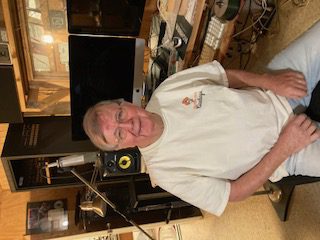
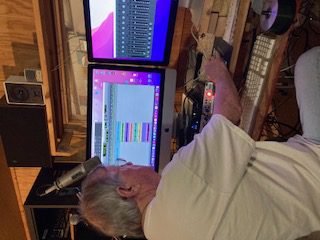
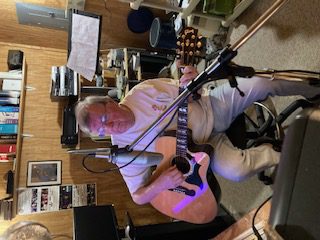
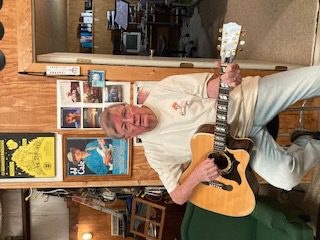
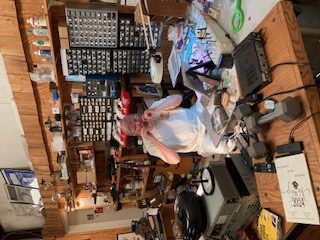
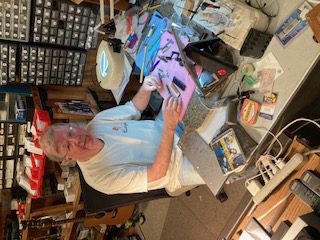
Photo captions: Peace Grocery in Short, Oklahoma, was owned by Mike Peace’s family, although it was destroyed in a fire in 1987. (Main image) Peace decided to honor the store – and his family’s legacy – by naming his album after it. Photos courtesy Mike Peace
“My brother and I took voice lessons in grade school and did recitals,” he recalls. “But when we got to be teenagers, we wanted to play football. My mom wanted me to take piano, but, it was, ‘No, we can’t do that stuff. That’s sissy stuff.’ So I never really got back to it until I was at Troy. I lived in a little trailer park, in an 8X35 trailer, and I only worked half a day in the air-traffic control tower at the little [Army] airport there. So I had lots of time, and I had my Bob Dylan albums, and I said, ‘I’m going to learn how to play guitar. I’m going to be Bob Dylan.’”
He chuckles. “So I drove to Montgomery and got me a really nice little Gibson acoustic guitar, bought a couple of harmonicas and a rack; luckily, I had a really good friend who was going to college and lived in the same trailer park. He was a local guitar player and singer, and his name was James Brown. He’s still alive. I finally looked him up on Facebook, and we reconnected.
“He’d come over, and we’d drink beer, and he’d show me chords. Like I said, I was going to be Bob Dylan – or James Taylor. I got into James Taylor, too, with the finger-picking and all.”
However, he didn’t start performing in front of audiences until he got his discharge papers and moved to Tulsa, near where he’d grown up. It was the very early ’70s, before there were many recording studios in the area, and Peace gravitated to one of the few, Derrick Studios, which had a subsidiary record label.
“I was hanging out there, drawing my unemployment from the Army, and trying to learn how to be an engineer,” he recalls. “That’s when I got acquainted with Don White and a lot of the Tulsa guys. [J.J.] Cale used to come in and record. Steve Ripley would come over.
“Don White had his gigs around town, and he’d heard me sing in the studio. When I’d go out to one of his gigs, he’d get me up to sing. So Don White ruined my life,” he adds with a laugh.
From there, Peace began playing and singing with different bands, leading ultimately to the Dinosaurs, which then laid the groundwork for a second career.
“In the Dinosaurs, I was playing harmonica with two electric lead-guitar players, and they were drowning me out,” he explains. “So I was always blowing reeds, ruining a lot of harps by trying to out-loud them.”
Then, in the late ’90s, Peace met a Vermont-based player named Jimmy Gordon at a harmonica convention. Gordon, as it turned out, was also an expert at working on the instruments. They became friends, and Peace himself learned the intricacies of harmonica repair. Since then, he’s been one of the major repairmen in that field, with clients from all across America.
That’s a long way from the business depicted on the cover of his new CD, Peace Grocery in Uniontown, Ark., about a mile from the Oklahoma border. But like the songs he’s chosen to feature on the disc, that old grocery store is something that’s stayed with Mike Peace, although it’s been gone since 1987, when it was destroyed by what he believes was an electrical fire.
“My great-grandfather established it around 1895, and after he passed, my grandfather took it over, during the Depression,” Peace says. “He raised six kids with the proceeds from that old store. Then, after my dad came home from World War II, he and my grandfather were partners, and then Dad started his own little store in Short, Oklahoma, which is just across the Arkansas border, and that’s pretty much where I grew up.
“Dad would always go back into the [original] store. He owned the building. He was kind of in and out, taking other jobs, but in the ‘80s, when that picture [on the CD cover] was taken, he still had it and was getting ready to retire.
“So,” he concludes, “using that name for the record is kind of a tribute to my family, my dad and grandfather and great-grandfather. They were stalwarts of that little rural community, very well known in the county. It was a nostalgic thing, I guess. I just wanted to honor them.”






















